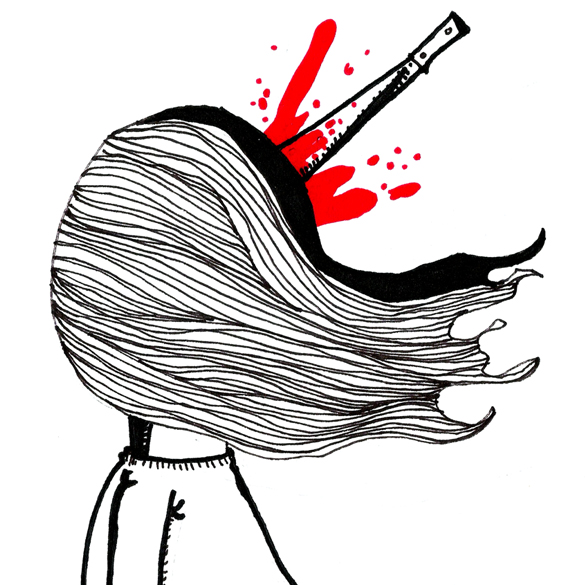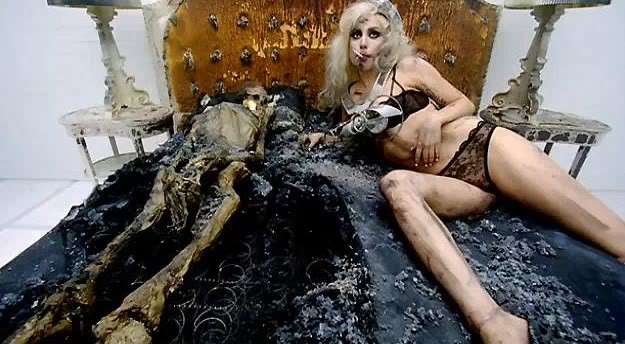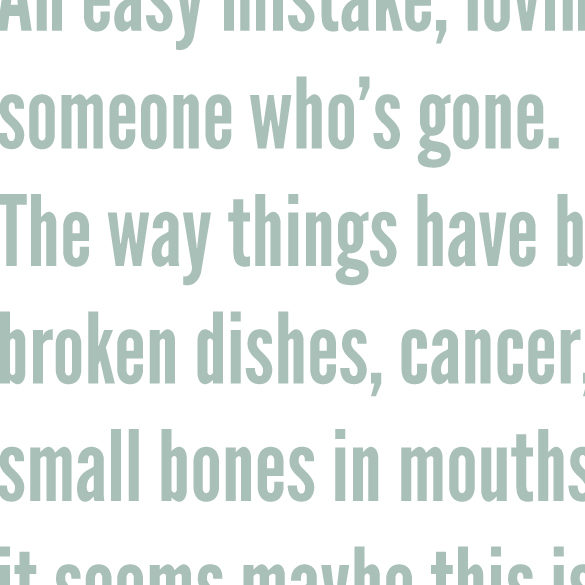
With his lawless mane of dirty-blond locks, the sort of facial kudzu familiar from photos of Civil War officers, and a penchant for posing wild-eyed with firearms in promo shots, Andy Fenstermaker has seen the looks and read the subtext: Crazy redneck.
Increasingly, that’s an image that belongs with the Confederate currency of Southern stereotypes, worth more as curios: Bible beaters and bootleggers, rifle racks and pick-up trucks, good ol’ boy-bigots and semi-literate hillbilly music, all stubbornly writ into America’s cultural consciousness. Fenstermaker, the 27-year-old Charlotte native who plays very literate hillbilly music behind the moniker Andy the Doorbum, concedes the truth-kernels in these old reductive views. He’ll even cop to one or two himself. But to his mind, the reason they won’t fade into the shadows of the new South’s diversity has as much to do with jealously as ignorance today.
“That’s why people poke fun at Southern culture, because it stands out so much,” he says over a restaurant plate of meat loaf and okra in Charlotte’s Plaza-Midwood district. “Not to say the South’s better than anywhere else, but some of the pivotal American music movements come from here and are spawned out of one of the more interesting cultures in the United States. When people have those negative connotations, I feel like I’m helping define what it means to be a Southerner now.”
Fenstermaker is too courteous in conversation to put that as he might in song, like he does on “The Farm,” from his fourth and latest album, the deeply personal The Man Killed the Bird, and With the Bird He Killed the Song, and With the Song, Himself. There, over a reeling acoustic strum and droning viola leavened by melodica, he relates in striking images the dark rural past of his “tribe,” railing against the shackles of traditions macro and micro. As the song concludes, he notches the tension to a feverish end and — for one of the few times on this double-LP — launches into his notorious throaty caterwaul, “I’ve heard tell of a thing called tradition/Well, we don’t buy that shit anymore.”
That’s just one of a handful of memorable moments from Andy the Doorbum’s most fully realized LP. The title comes from a Pygmy proverb that he says captures how creativity inspires him to persevere through difficulties past and present — and there’s plenty of persevering to do in these stories. Setting aside most of the experimental sketch-bursts and psychotropic country stomps of his previous work, the new record’s 12 tracks are cut mostly from the same processional-ballad cloth. These are scaled-back acoustic folk ruminations with banjo, melodica, fiddle, horns and gang choruses that accompany tales set in the seedy underbelly of modern urban life and rural hardship. “There is symbolism, and there are scenarios from my life, and it’s not always pretty,” he concedes.
The music, though, often is. Known for his gruff bellow and roar, his voice here retreats to suit the tenor of minor keys and slower tempos, though it remains scruffy, wounded and off-key in all the right places. He insists that the songs’ somber tones are ultimately optimistic, their calm an entry point — and balm — to the unraveling sanity in the narratives. “Creating nice songs about weird nasty things” was the goal, he says, and the post-apocalyptic scenarios, imploding families, rampant over-indulgence, and death obsessions drive the point home.
But this is no nihilist’s screed or black-and-white sloganeering. The people that populate these stories live in emotionally and morally complicated grey scales; writing from an early age has sharpened his eye for human frailty and helped trim the fat from his prose. He calls these lyrics the best he’s ever done: “The Orgy” condemns those “rotten with ambition” to a life where longing “is all that there will be;” “The Favor” begins as an anti-suicide homily until the person who steps in as savior has their own self-serving motives uncovered; the mass-gravedigger in “The Ditch” offers comfort as he goes about his work readying people for the worms; and “The Sisters” is a slow, super-creepy tale of closeted dead siblings, an Appalachian cousin to Nirvana’s serial killer tale “Polly.”
Grim stuff, but Fenstermaker insists all those “nasty and horrible things” are essential to making the world the “amazing place that it is.” Anyone who’s met him for five minutes, he adds, can see he’s a “feel-good kind of dude” (Author’s Note: This is true). For that, he credits the dark songs for their therapeutic quality.
But it goes beyond catharsis. As far as he is concerned, what’s happening now is all gravy. Writing songs, touring and playing music across America, traveling the globe, making art and cohabitating with his artist girlfriend (the talented NC painter Kelly Keith) — for much of his life, all of that was “pie in the sky.”
“As a kid, I didn’t think it was possible — it was a waste of time to even imagine it would happen.”
· · ·
Like a lot of today’s Southerners, Fenstermaker comes from somewhere else. He was born in the Pennsylvania town of Titusville, tucked away in the northwest corner of the state closer to Eerie, N.Y. than Pittsburgh. It’s the birthplace of the oil industry, and the place where, years later, his father would add to his cumulative jail time by drunk-driving his pickup truck into town hall.
Andy is mostly mum on the details of a difficult childhood, and insists that he and his old man have patched things up. At the age of 1, his parents, before their divorce, piled Andy, his older brother and all the furnishings and clothing that would fit into a ’52 International pickup and moved to the N.C. Piedmont. Until he graduated from East Gaston County High, his world consisted almost entirely of rural Gaston County and his family’s farm in Pennsylvania where he spent summers with his dad. “I’d lived in the country all my life,” he says. “I didn’t even know howto move to the city.”
Before he tackled that, though, he had a decision to make after graduation when his grandmother passed away and left him $2,000. He thought about getting his first car, but stumbled on an old travel guide of Iceland that was a year his senior. Seduced by the photos, he spent a month camping and hitchhiking across the island during its near-endless days. “It was the stupidest, scariest thing I’ve ever done,” he laughs, “but I got the travel bug bad.”
Less than a decade later, he’s been to 46 of 50 states, and his passport bears entry stamps from 15 foreign countries. Travel is now the prime mover behind most everything he does, whether it’s riding his 100-mpg scooter or working the door at Snug Harbor and the Milestone Club in Charlotte six nights a week. It’s still done on the cheap, too, a tent his hostel and a thumb his transport. It’s inspiring to experience other topographies and cultures, but the purpose is just as much to step out of the comfort zones he’s so wary of. He’s not beyond putting himself in “seedy little situations” on the road just to court new adventures.
“It’s like doing piles of hallucinogenic drugs without any of the crazy and horrible stuff,” he says, though quickly amending; “Well, I’ve had some crazy and horrible stuff happen to me while traveling, but I love it — it’s still part of the experience.”
It’s also taken live Doorbum music to some interesting places. He’s played Amsterdam clubs and jammed on a Spanish stage with Nigerian Touareg group Etran Finatawa in front of 3,000 fans. He’s played dance recitals and library openings, barns, basements and illegal warehouse shows in Los Angeles. Wherever he goes, he finds himself in the role of unofficial ambassador for the South.
“People seem to be really excited about that — ‘You’re from the South? What you’re doing musically must be very interesting,’” he says, citing this as the other stereotype he typically encounters. “I feel fortunate people would make that assumption. I hope I follow through on it.”
He has, and showed early signs he would. He formed his first band at the age of nine — a quartet of stuffed animals he’d give different voices to while he banged on kitchenware for accompaniment. (He still has cassettes of The Scruples, as he dubbed them.) His dad gave him his first guitar at14, and he soon matriculated to 4-track recordings; before the Doorbum years, he estimates he recorded 10 LPs worth of original material, but kept them to himself.
He soon started playing in punk bands, the most notable being Charlotte’s IYF PoRK. In the early aughts, they played Queen City Underground gigs, where he met Neal Harper, one of the venue owners. As IYF PoRK wound down, and in need of a job, he began pestering Harper to let him work the door at the Milestone, which Harper rescued from obscurity in 2004.
Working at the club seven nights a week, he wound up living there with Harper for eight months rather than driving back and forth to Stanley. After shows, they’d talk and party and play music — and on at least one drunken night take target practice inside the Milestone after it closed. (The two were shot at shortly after Harper reclaimed the club from the sketchy, drug-riddled neighborhood.) Eventually, he let Harper hear the tapes he’d made, and the 2013 Wolves guitarist/songwriter loved them. Out of that confidence builder, and buoyed by some successful solo gigs, 2005’s The Doorbooth Album eventually emerged: 25 below-lo-fi tracks recorded to 4-track entirely in the closet-sized space of the club’s doorbooth.
The music was the promising mess of an eccentric Southern voice, the songs peppered with references to bird flu, Yetis, drugs and death. It struck a chord with friends and patrons — who’d taken to calling him the ‘doorbum’ guy for his vagrant-friendly fashion sense. Some of the out-of-town bands took note, too, lobbying him to join them on tour after catching his act.
He picked up his playing and recording pace, and soon began touring the Southeast and Midwest on his own. The Mt. Holly Sessions followed in 2007, a (relative) step up in fidelity that was recorded to computer with frequent collaborator Robert Childers. Songs like “Alamissibamassippi,” “Ode to Extinction” and “Horace Wells & the Chloroform Addicts” — about the nitrous oxide inventor who got addicted and during a deranged episode poured sulfuric acid on two prostitutes, then killed himself when he came out of it — only confirmed the bizarre rabbit hole he was heading down. If a tweaker Johnny Cash and rural Hubert Selby, Jr. collaborated, and occasionally let Tom Waits or David Yow sing, it might sound like this.
Then came 2009’s Art Is Shit, which by his own account is when Andy the Doorbum began to flesh out on record what he heard in his fertile imagination. Recorded on a 24-track recorder, it’s a dizzying 67-minute sonic whirlwind through a gritty, poignant and often hilarious world of crack-whores and hobos, brutal 17th century executioners and a Pennsylvania ghost-mining town that’s been burning for 50 years. Though it may suffer from ‘let’s see what else I can track on here’ over-exuberance, it also marks the spot where his dark urban visions, foreign travels and rural past gel into a coherent aesthetic. The imagery feels alive, even feral, drawing cogent parallels between fucked-up city streets and a farm where death and decay are often an everyday harvest.
More and more, those summers spent on his family’s farm weed their way into his narratives as he comes to terms with his past, culminating now in one of the main settings for The Man Killed the Bird. Once stretching over an entire valley, the farm has been in his family since shortly after the Fenstermachers immigrated from Germany in 1737 and dropped the “ch” for a “k” in their name. It’s a wild, off-the-grid 100 acres where animals get slaughtered for food, cable TV and cell-phone reception don’t exist, past-generation relatives have frozen to death, and a schizophrenic uncle lives electricity-free in a trailer. It’s a harsh existence, but he insists it’s not all that different from Gaston County.
“Western Pennsylvania, with the exception of the accent, (is) culturally almost identical,” he says. “They’re country mountain folk. The Alleghenies are part of the Appalachian Mountains. And I always think that Appalachia and Southern culture are kind of synonymous. Bluegrass, moonshine stillin’, bootlegging — all of that.”
Religion is a key songwriting inspiration in that culture, and now a favorite target of his. Growing up, he wrote his first poem for Jesus and says he adopted the trappings of Southern Christianity of his own accord. It didn’t stick, though. “I got older, asked too many questions, and there weren’t suitable answers for any of them.” He now believes that our energy goes on after us, though, we’re not conscious of it anymore. That’s haunted him since childhood comes from, and it pervades his music today. “Even if I was a vaporous mist,” he says, “I would enjoy knowing I was a vaporous mist.”
The answer as he sees it is to experience everything you can before they turn out the lights. That explains the lust for travel, and also his fondness for drugs. He calls himself an advocate for responsible drug use, but “to get as much reality as I can,” not to escape it. Drugs aren’t bad, he insists, only dangerous, and no more so than driving a car or growing obese and stupefied in front of a television. He captures that fine line between addiction and enjoyment on “Medicamentum,” perhaps his finest song to date and the A-side of a split 7” he did with Charlotte’s Yardwork early in 2011. “It says to take one, so I take 10/It don’t seem wrong until I fall/For 13 years I couldn’t remember anything/Suddenly I can see it all,” he sings over a galloping guitar and gang vocals until a hymnal organ shows up to escort the outro.
“You just have to be as responsible as you can about the decisions you’re making,” he says, “and try to make those that will enrich your life with experiences that you would not otherwise have.”
· · ·
When Shuffle first caught up with Andy this summer, he was in the forests of Maine on his way to play a mountaintop house show near the town of Peru, and touring with spaz-core dude Emotron. That gig with his frequent touring mate turned out to be in an appropriately named venue — the Passout House. Midway through the Emotron’s set, as the two exchanged turkey calls, he slid from his stool to the floor in what for all the world looks like an epileptic seizure (you can watch it on YouTube). He says the heat — it was 105 degrees that day, the hottest ever recorded in Maine — and a lack of water and AC contributed.
But what left a bigger impression that night, never having played the state before, was finding 50 kids at a house show on a mountaintop in the middle of nowhere Maine bellowing along to his strange ode to smoking and addiction, “Love Song for Cigarettes.” That’s one measure of success for which he’s grateful. But when you compare his music to the great folk art traditions of the South, he gets to the nub of what’s truly driving him.
“The only success I ultimately care to attain is of artistic integrity,” he says. “If art pours out of you, it’s all you know — you can’t compromise that and remain genuine. The best thing I have to offer as a human being is doing my art.”
That’s true, and getting truer. But he’s offering us something else as well: a very good reason to alter our notions about crazy rednecks.
—-
This story was originally published in Shuffle Magazine.


